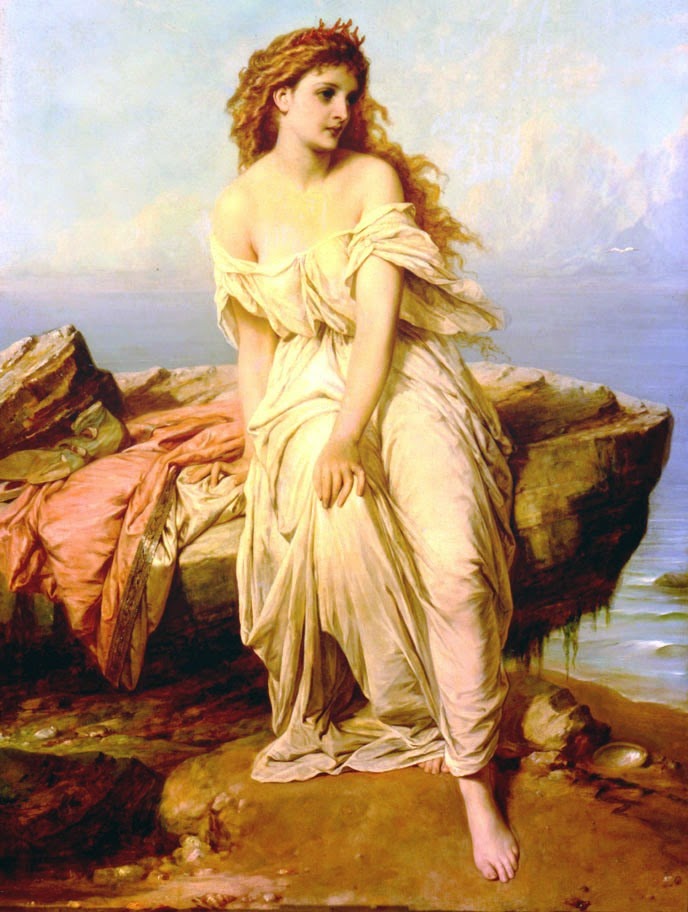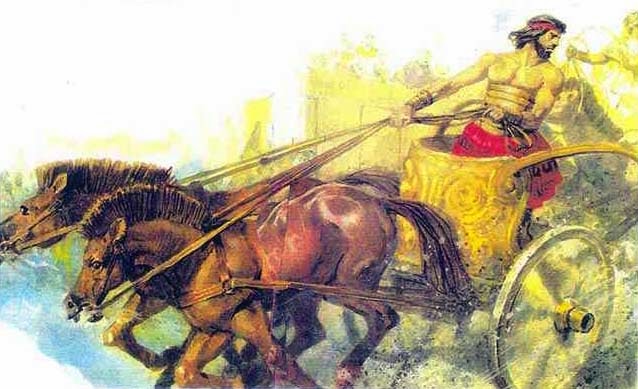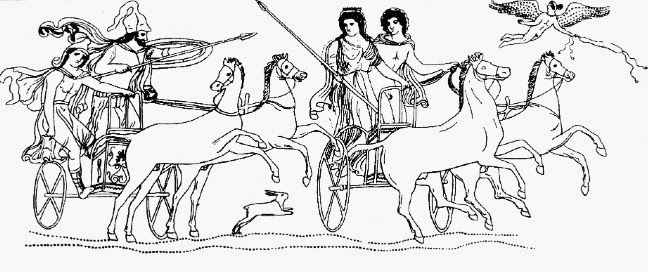THE SOUTHWORTH PLANETARIUM
207-780-4249 www.usm.maine.edu/planet
70 Falmouth Street Portland, Maine 04103
43.6667° N 70.2667° W
Altitude: 10 feet below sea level
Founded January 1970
Julian Date: 2459412.18
2020-2021: CXLIX
THE ONCE OR TWICE A WEEK ASTRONOMER
Monday, July 19, 2021
The Myth of Myrtilus
_________________________________
the regular DA returns on September 1st
_________________________________
Oenomaus: "You're not marrying MY daughter."
Oenamaus, the Arcadian king who governed Pisa and Elis, had three sons and one daughter, all of whom he sired on Sterope, daughter of Acrisius. (Not to be confused with the Pleiad Sterope, daughter of Atlas.) His sole daughter, named Hippoodaemia, was, as one would expect in the mythological realm, so enchantingly beautiful that many men desperately wanted to marry her. Unfortunately, King Oenamaus desperately wanted her not to marry. Some say that he heard a prophecy warning him that he would be killed by his son-in-law. Others claim -distastefully- that Oenomaus had fallen passionately in love with his own daughter and couldn't bear to have her in another man's bed. So, either incestuous desire or simple fear of death induced the king to devise a scheme that he hoped would prevent Hippodaemia from ever becoming anyone else's wife. He challenged any suitor to a chariot race extending from Zeus's Olympian temple to Ithaca, a distance that by modern standard measures about 225 kilometers. Although the suitor was allowed to use whatever chariot he chose, he was required to have Hippodaemia accompany him on the race. The king knew that Hippodaemia's presence would likely distract the love-besotted man.

Hippodaemia
If the suitor won the race, he would be permitted to marry Hippodaemia. However, if Oenamous prevailed, the suitor would die. The king allowed the suitor to have a half-hour head start, during which time the king offered sacrifices to Zeus. Despite this "advantage" the king invariably caught up to the suitors as his chariot was driven by Psylla and Harpinna, two mares who were swifter than the North Wind, which was believed to have been their father.
Perplexed zoologist
As if these mares didn't give the king enough of an advantage, Oenamous' chariot driver Myrtilus was known to have been the best of them all. It is little wonder that the king came abreast of each of the first twelve suitors who were brave enough to participate in the chariot race. Incidentally, whenever Oenamous' chariot pulled up beside the suitor's chariot, the king impaled the unfortunate young man with a spear given to him by the war god Ares, believed by some to have been his father. Oenamaous derived such delight at these killings that he dismembered their corpses and adorned his palace with their remains. All was proceeding rather swimmingly for the king -if not for the suitors- until the bloodthirsty monarch openly declared that he would construct a temple of young male skulls that would "puncture the sky." During this boast, he implied that the bone-laden temple would be in honor of himself as opposed to any of the Olympians, who, admittedly, might not have wanted it, anyway. All the same, his audacious declaration drew the attention of the gods and ultimately led to the King's undoing.

Pelops
Conveniently, around the same time, a strong and handsome young man named Pelops appeared in the kingdom. Those who've paid close attention to these mythological chronicles might recognize that name. A member of the house of Atreus, Pelops was the ill-fated son of Tantalus, the mad king who killed him and placed his flesh in a stew that he attempted to feed to the gods. Most of the Olympians knew at once the contents of the stew and had pushed the bowls away. Zeus banished Tantalus to Tartarus where he suffered the ineluctable torments of burning thirst and ravenous hunger. Zeus then commanded the fates to resurrect Pelops and ordered Hephaestus to make him an ivory shoulder to replace the one that Demeter had absentmindedly eaten. Demeter had been so distraught at her daughter Persephone's abduction by Hades that she sampled the stew before becoming aware of its gruesome ingredients. This prosthetic looked so genuine, however, that it went largely unnoticed.
Pelops had traveled to Pisa for he had heard both of Hippodaemia's beauty and of the chariot race challenge. He was determined to win the race and the king's daughter. Prior to his arrival, Pelops had prayed to the ocean god Poseidon for his assistance. Poseidon gave him a golden chariot drawn by horses said to have been so swift that they could have driven the chariot across the sea without even moistening the axles. When Hippodaemia caught sight of the gorgeous Pelops, she fell in love with him instantly. She knew that Pelops had accepted her father's chariot race challenge and was determined to assist this suitor. She approached Myrtilus and promised him "any favour of his choosing" if he would help Pelops win the race. As we shall see, her phrasing would prove problematic.
Just before the race, Myrtilus replaced the iron rods connecting his master's chariot with the horses with one fashioned of wax. As usual, the King allowed his opponent a head start, but when he noticed the swiftness of Pelops' chariot, he ordered Myrtilus to set off almost at once, as opposed to waiting half an hour. Had he waited, he would most certainly have lost the race. As it was, the king's chariot approached Pelope once toward the last stretch of the course. As Oenomaus withdrew his spear and prepared to attack, the waxen rods came loose and sent the chariot careening over a cliff. Although Myrtilus leapt out in time, the king remained in the chariot and perished in the fall. Before he struck the sea, the king, knowing himself to have been betrayed, cursed Myrtilus in the strongest terms.
As the echo of this curse faded into silence, Pelops halted the chariot and drew Myrtilus into it. Pelops, Hippodaemia, who had ridden with Pelops on her father's orders, and the chariot driver raced across the sea to a nearby island where they stopped to find potable water. While Pelops was searching for a stream, Hippodaemia came running to him in hysterics. Her clothes were torn and her face bloodied. "Myrtilus attempted to ravish me," she declared between convulsive sobs. When Pelops angrily confronted Myrtilus, the charioteer insisted that Hippodaemia had promised him any favor of his choosing in exchange for his assistance. Despite this assistance, Pelops remained unmoved and he kicked Myrtilus so hard that the latter also fell into the sea to his death.
Hermes gathered Myrtilus' body into his arms and hoisted him up into the sky where he became the constellation we now call Auriga the Charioteer. It was said that when Myrtilus was descending to his death he, too, expended his dying breath to issue an imprecation: a curse not only on Pelops but on his entire house of Atreus. He needn't have bothered, however, for Tantalus' grotesque breach of dinner etiquette had doomed the house already.
THE SOUTHWORTH PLANETARIUM
207-780-4249 www.usm.maine.edu/planet
70 Falmouth Street Portland, Maine 04103
43.6667° N 70.2667° W
Altitude: 10 feet below sea level
Founded January 1970
Julian Date: 2459412.18
2020-2021: CXLIX
THE ONCE OR TWICE A WEEK ASTRONOMER
Monday, July 19, 2021
The Myth of Myrtilus
_________________________________
the regular DA returns on September 1st
_________________________________
Oenomaus: "You're not marrying MY daughter."
Oenamaus, the Arcadian king who governed Pisa and Elis, had three sons and one daughter, all of whom he sired on Sterope, daughter of Acrisius. (Not to be confused with the Pleiad Sterope, daughter of Atlas.) His sole daughter, named Hippoodaemia, was, as one would expect in the mythological realm, so enchantingly beautiful that many men desperately wanted to marry her. Unfortunately, King Oenamaus desperately wanted her not to marry. Some say that he heard a prophecy warning him that he would be killed by his son-in-law. Others claim -distastefully- that Oenomaus had fallen passionately in love with his own daughter and couldn't bear to have her in another man's bed. So, either incestuous desire or simple fear of death induced the king to devise a scheme that he hoped would prevent Hippodaemia from ever becoming anyone else's wife. He challenged any suitor to a chariot race extending from Zeus's Olympian temple to Ithaca, a distance that by modern standard measures about 225 kilometers. Although the suitor was allowed to use whatever chariot he chose, he was required to have Hippodaemia accompany him on the race. The king knew that Hippodaemia's presence would likely distract the love-besotted man.

Hippodaemia
If the suitor won the race, he would be permitted to marry Hippodaemia. However, if Oenamous prevailed, the suitor would die. The king allowed the suitor to have a half-hour head start, during which time the king offered sacrifices to Zeus. Despite this "advantage" the king invariably caught up to the suitors as his chariot was driven by Psylla and Harpinna, two mares who were swifter than the North Wind, which was believed to have been their father.
Perplexed zoologist
As if these mares didn't give the king enough of an advantage, Oenamous' chariot driver Myrtilus was known to have been the best of them all. It is little wonder that the king came abreast of each of the first twelve suitors who were brave enough to participate in the chariot race. Incidentally, whenever Oenamous' chariot pulled up beside the suitor's chariot, the king impaled the unfortunate young man with a spear given to him by the war god Ares, believed by some to have been his father. Oenamaous derived such delight at these killings that he dismembered their corpses and adorned his palace with their remains. All was proceeding rather swimmingly for the king -if not for the suitors- until the bloodthirsty monarch openly declared that he would construct a temple of young male skulls that would "puncture the sky." During this boast, he implied that the bone-laden temple would be in honor of himself as opposed to any of the Olympians, who, admittedly, might not have wanted it, anyway. All the same, his audacious declaration drew the attention of the gods and ultimately led to the King's undoing.

Pelops
Conveniently, around the same time, a strong and handsome young man named Pelops appeared in the kingdom. Those who've paid close attention to these mythological chronicles might recognize that name. Pelops was the ill-fated son of Tantalus, the mad king who killed him and placed his flesh in a stew that he attempted to feed to the gods. Most of the Olympians knew at once the contents of the stew and had pushed the bowls away. Zeus banished Tantalus to Tartarus where he suffered the ineluctable torments of burning thirst and ravenous hunger. Zeus then commanded the fates to resurrect Pelops and ordered Hephaestus to make him an ivory shoulder to replace the one that Demeter had absentmindedly eaten. Demeter had been so distraught at her daughter Persephone's abduction by Hades that she sampled the stew before becoming aware of its gruesome ingredients. This prosthetic looked so genuine, however, that it went largely unnoticed.
Pelops had traveled to Pisa for he had heard both of Hippodaemia's beauty and of the chariot race challenge. He was determined to win the race and the king's daughter. Prior to his arrival, Pelops had prayed to the ocean god Poseidon for his assistance. Poseidon gave him a golden chariot drawn by horses said to have been so swift that they could have driven the chariot across the sea without even moistening the axles. When Hippodaemia caught sight of the gorgeous Pelops, she fell in love with him instantly. She knew that Pelops had accepted her father's chariot race challenge and was determined to assist this suitor. She approached Myrtilus and promised him "any favour of his choosing" if he would help Pelops win the race. As we shall see, her phrasing would prove problematic.
Just before the race, Myrtilus replaced the iron rods connecting his master's chariot with the horses with one fashioned of wax. As usual, the King allowed his opponent a head start, but when he noticed the swiftness of Pelops' chariot, he ordered Myrtilus to set off almost at once, as opposed to waiting half an hour. Had he waited, he would most certainly have lost the race. As it was, the king's chariot approached Pelope once toward the last stretch of the course. As Oenomaus withdrew his spear and prepared to attack, the waxen rods came loose and sent the chariot careening over a cliff. Although Myrtilus leapt out in time, the king remained in the chariot and perished in the fall. Before he struck the sea, the king, knowing himself to have been betrayed, cursed Myrtilus in the strongest terms.
As the echo of this curse faded into silence, Pelops halted the chariot and drew Myrtilus into it. Pelops, Hippodaemia, who had ridden with Pelops on her father's orders, and the chariot driver raced across the sea to a nearby island where they stopped to find potable water. While Pelops was searching for a stream, Hippodaemia came running to him in hysterics. Her clothes were torn and her face bloodied. "Myrtilus attempted to ravish me," she declared between convulsive sobs. When Pelops angrily confronted Myrtilus, the charioteer insisted that Hippodaemia had promised him any favor of his choosing in exchange for his assistance. Despite this assistance, Pelops remained unmoved and he kicked Myrtilus so hard that the latter also fell into the sea to his death.
Hermes gathered Myrtilus' body into his arms and hoisted him up into the sky where he became the constellation we now call Auriga the Charioteer. It was said that when Myrtilus was descending to his death he, too, expended his dying breath to issue an imprecation: a curse not only on Pelops but on his entire house that of Atreus. He needn't have bothered, however, for Tantalus' grotesque breach of dinner etiquette had doomed the house already.
Auriga the Charioteer: visible in the predawn eastern sky
To subscribe or unsubscribe from the Daily Astronomer:









